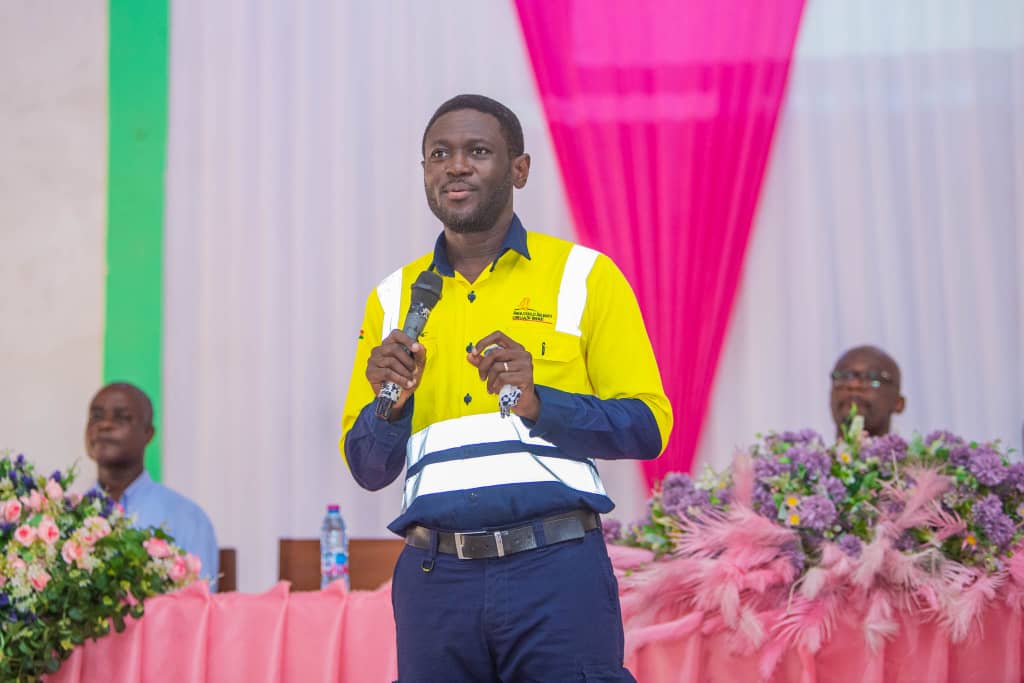
The students while attending a Buckeye football game realized the emissions that were taking place with the use of heavy gas generators as a portable power source and felt the need to find an alternate power supply solution.
This has led to the group together with a doctoral student come up with a battery pack, delivery system, and mobile app to replace those emissions-heavy gas generators.
The three Engineering undergraduates, Caleb Buaful, Jacob Buaful, Jr., and Anita Nti along with doctoral student, Danny Freudiger, using their technology have founded a company, Electrion and have already attracted investors to join them in commercializing their energy storage as a service (ESaas) system.
At the OSU football tailgates in 2019, the group spoke to Buckeye fans about how much energy they used for things like TVs, slow cookers, mini-fridges, and even satellite dishes powered by the generators before, during, and after the game.
Through observations, campus data, and scientific research the group discovered that tailgate parties that use gas-powered generators emit over 120,000 pounds of carbon dioxide. Which is equivalent to over 3,200 sedans for the same period of time.
The students who are members of a student-driven, multidisciplinary organization, Smart Campus, which was actually founded by Freudiger, saw this as an opportunity for a project that aligned seamlessly with the university’s goals of becoming carbon neutral by 2050.
Nti, who is the president of Smart Campus, speaking about how the idea for Electrion came about said, “We came back and started talking and thinking, ‘If that’s just from one day, that’s thousands of pounds of CO2 being emitted at just one Ohio State game, how much more would be over a season and then at other schools across the nation as well?’” she asked then continued, “We saw that as a very significant impact, so we thought about how we could possibly be a solution.”
The alternative that the team is developing is a system consisting of rechargeable battery packs, a sustainable mobile delivery service via electric cargo bikes, and a logistics platform to coordinate battery distribution and track status.
“From there we really thought about the user experience. Because you are providing this as an alternative, you want that transition to be smooth. If it’s too hard, they’ll just keep using the generator because it’s easy to use,” Caleb Buaful adds.
BJ Yurkovich, a researcher at Ohio State’s Center for Automotive Research (CAR), is mentoring the students and has shared how exciting it was to watch them develop cutting edge technology.
“It’s been exciting to watch this talented team of students not only develop cutting-edge technology but also navigate the complexities of entrepreneurship and business development,” he said.
With the help of an $89,000 Ohio State Sustainability Fund grant, the team has been able to launch a proof-of-concept project. The team has also connected with MegaJoule Ventures, which is an investment firm that shares their passion for sustainability. The firm has invested $250,000 to support the team as they accelerate the formal market introduction of Electrion products as well as the development of the engineering and design tools that are needed to integrate a wide range of battery chemistries.
MegaJoule Ventures CTO Michael Gurin sharing his excitement about the company’s opportunity to invest in Electrion said, “MegaJoule Ventures is excited about the Electrion opportunity because of the great team in place both in terms of vision, but also the depth of knowledge they gained and the accelerated deployment schedule they maintained in releasing an advanced prototype.”
“Their fundamental understanding of the electrical energy storage market is also strategically aligned with our investment strategy,” the MegaJoule Ventures Chief Technology Officer adds.
Electrion's founders are building their product prototypes in their workspace at CAR while brainstorming concepts in hopes of extending their “sustainable energy on-demand” model. Freudiger notes that everything they do should have a focus on sustainability. “I think everything we do should be about sustainability,” he said.
“One of the bigger reasons why we’re here is to leave the world a better place than we found it so future generations can enjoy it and have it better off than we did, hopefully, if we do things the right way. I think all of that is centred around sustainability. It’s sustainability for energy. It's a sustainable community. There are so many different components to sustainability, and that’s why I think it’s so important that we keep it at the front of our minds all the time.
Although developing new technology that impacts the environment in a great way is exciting, what fuels the group’s passion is sharing this new product with children in their local school districts.
“Honestly, what separates people from each other and from opportunities, money, or resources is just access to knowledge. That’s really the key,” Jacob Buaful said. He adds that the groups “idea is to go out there into classrooms and do the big general assembly talks informing people of what sustainability is and how they can help.”
Caleb Bualfal also asserts that the group is creating an opportunity that wasn’t present when they were younger. “We’re starting them while they’re young so they can start thinking about it and getting into it,” he said.
Nti on her part sees her interest in the Electrion project to be sustainability and she’s inspired by the knowledge gaps that she observes to continue on in the field. “People automatically think of sustainability on such a large scale and totally negate the fact that there’s so much we can be doing on a smaller scale that can come together to actually make a large impact.”
The three students are also members of Pentecost International Worship Center (PIWC) Columbus North District in Ohio.
Read Full Story



























Facebook
Twitter
Pinterest
Instagram
Google+
YouTube
LinkedIn
RSS